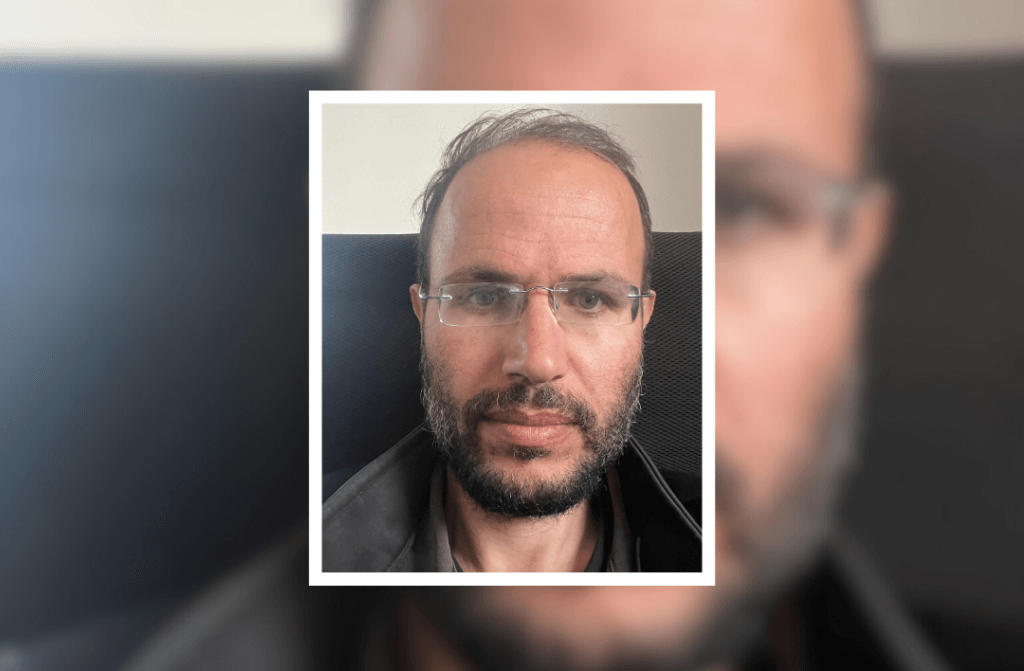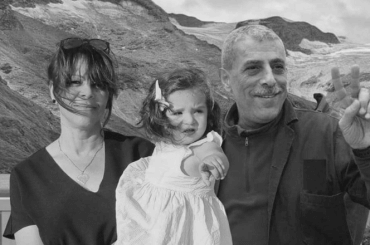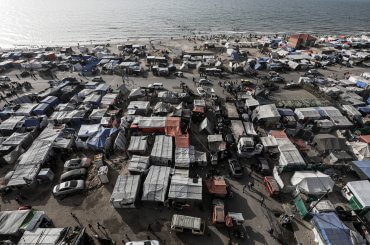“No, don’t kneel,” my cousin Saja begged me tearfully, hugging me as she watcheded me react to the news. I wept, falling to the ground, my knees unstable.
Saja’s visit on December 8 is the heaviest yet since Israel’s intense bombardment of Gaza began on October 7, 2023. On that day, I found out that my professor, Refaat Alareer, 44, was killed on December 6 for telling the truth about the Palestinian people and their stories in the besieged Gaza Strip.
In 2019, he taught me to write my first poem until I recited it at the poetry fair at the Islamic University of Gaza (IUG). “Proud of you, Amna. You rose up to the challenge,” he texted.
In 2021, he called me a “colleague” and assisted me in my first teaching experience at the IUG. “Congrats, Amna. You will teach an English requirement course,” he texted.
Last September, he supported me in my first training experience. We compiled the training materials together. “Great job. You’ve done more than enough,” he texted.
At the end of November, he made sure I was safe. I told him I was okay but still couldn’t share my stories with the world because the internet connection was unstable. “It’s okay; just stay safe,” he texted.
In December, he stopped texting me.
Having learned of Dr. Refaat’s assassination, I spent the whole day wailing. I had never imagined that he would be killed throughout the war, and always assumed that by the end of it, he would emerge as one of its witnesses and key storytellers.
During all the past Israeli aggressions against the coastal enclave, he documented and shared his children’s stories, conversations, concerns, and wishes. When those wars wound down, he would gather us, his students and trainees, and urge us to amplify the voices of Gaza’s bereaved — the children, the youth, and the women whose stories needed to be told.
‘Move on. You’re running out of time’
The idea that Dr. Refaat will never show up or text to check in on us, or to compile the stories we wrote in a new book, has been haunting me since December 8. For solace, I recalled an older story of Dr. Refaat.
In 2022, he and I were supposed to travel to Spain to attend a training program with some colleagues, yet he left me earlier than expected before I reached my destination — what was intended to be our destination.
On the morning of July 18, Dr. Refaat was waiting for me in a car to go together to the Rafah Border Crossing, from where we would cross into Egyp and fly to Spain via Cairo Airport. We moved from one hall to another. He moved lightly with only his backpack, helping me and our other colleague carry our suitcases.
He ensured every one of us was okay, that we had finished the necessary procedures, and stayed on the right path. His presence was reassuring, and we didn’t make the next move before looking to him for confirmation, which proved simple due to his height and characteristic agile movement, making him easy to identify.
To help us pass the time and wait on the journey from the border to the Egyptian hall on the other side of the Rafah crossing, he amused us with stories. He even created many scenarios for the journey to stay prepared. “I might go home, and you will travel on your own,” he joked.
Six hours later, the joke was to be realized. We learned that Dr. Refaat was denied the visa.
“Returned,” he texted.
“I’m not sad,” he murmured, explaining that the feeling was sore deep inside of him. “What did I do?” he complained, wondering why an academic should be banned from traveling.
With his light blue shirt and grey trousers, he stood leaning towards the decaying chairs of the hall and expressed the pain and anguish inside him to a friend whose 60-year-old mother had also been returned. I cried silently at him to bid him farewell.
“Move on. You’re running out of time,” he urged us to complete our journey to the airport, waving his hands from afar and nodding his head.
We moved on. And he left.
The journey from the hall to the airport was difficult, as we found ourselves turning as if to look for him, waiting for his directions. In the packed hall, I looked for his hand gestures. All that flashed before my eyes was “returned.”
Gazing at comers and goers moving freely together in and out of the airport, I felt sorry for him that he was deprived of the journey and for myself that I was deprived of his company.
But it empowered me that he left me his hat, three dates to support my frail body, a charger, some money, and dozens of stories.
‘You must live, to tell my story’
Every day since December 8 has been wrapped up in guilt, to remain breathing while Dr. Refaat was murdered. Weeks later, I realized the importance of the lesson I learned in 2022 when he left me earlier than expected.
“If I must die, you must live/ To tell my story.”
The moon was full, casting its light on the bedroom. Luckily, my phone was connected to the internet, allowing me to read Dr. Refaat’s famous poem, “If I Must Die.” With tears welling up in my eyes, I scrolled through the poem, which by now had circulated all over the world and was translated into 39 languages.
My grief was full. Leaning backward at the cold wall and looking at the sleeping faces of my parents and siblings, I heard the voice of Dr. Refaat reading the poem and breaking the silence as if I sat in the 2019 poetry lecture in the crowded room, watching his hand gestures and listening to his thrilling explanation of the pun in the word “tale” at the end of the poem.
With these words, I felt like Dr. Refaat, even after he was killed, addressed each student of his through his eternal words, including me. I realized that, although he left, his poem remained, giving me a pat on the shoulder, holding my hand, and urging me to dare to live — and write.
‘Knowledge is Israel’s worst enemy’
The year 2024 approached. Aimlessly, I sat watching the dimmed moonlight. By the end of 2023, I would have finished my MA plan except for the audiovisual translation course that Dr. Refaat had planned to teach us. As I imagined that anticipated future, it seemed now like a cruel joke in the face of all the death.
Raising my eyebrows in awe, laptop in my arms, I browsed old files on my PC to find one of Dr. Refaat’s books. When I read the article he wrote a decade ago, I realized that my question was finally answered.
“Knowledge is Israel’s worst enemy. Awareness is Israel’s most hated and feared foe.”
In that 2014 article, “There are no poems of mass destruction,” he wondered why Israel would bomb the Islamic University of Gaza, where he taught literature. He lamented the destruction of his office, where he met hundreds of students for further discussion and office hours.
It is March 2024. The entire university he so loved is now rubble. Dr. Refaat was murdered. There will be no spring semester or audiovisual translation course. The only course is ongoing death. But I’ve finally realized something about Refaat’s lessons and the power that his words had: they kept him alive.
No one ever can rob me of his inspiration, I insist to myself. As long as I breathe, I will tell his stories and the endless stories of my city, occupied and silenced, in light of his tales. I sighed, wiping my tears and recalling how Saja helped me stand back up on that day before she whispered, “They can’t bring us to our knees.”



Beautiful and powerful, Amna, thank you. Yes, Professor Alareer lives. For what it’s worth, your Palestinian brothers and sisters teach his words every day here in the US. We stand with you.
The more I learn of Dr Refaat Alareer, the more admiration I have for him. Thank you for sharing your love for him and your experience of his kindness. The linked article by him that you provided has a lot of wisdom:
We see from the few Zionist fanatics commenting on this site how they detest the knowledge and understanding that Mondoweiss (along with other pro-Palestinian sources) brings to the world. Just a few years ago I had little interest in the Palestinian people. Here in the UK, none of my friends mentions it, even now during the mass killings. But as I grew more aware of it through sites such as this one, I grew to learn of the injustice, the suffering and the righteous desire for liberation amongst the Palestinian people. They are imperfect like all of us but their cause is one of the most urgent of our times.
A beautiful piece and tribute. You can kill people but you can never kill ideas.